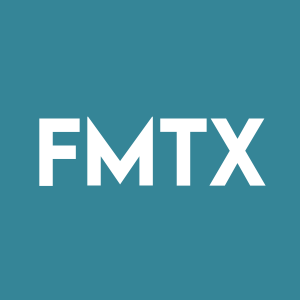Forma Therapeutics Reports Fourth Quarter and Year-end 2020 Financial Results and Provides Business Update
Forma Therapeutics Holdings (Nasdaq: FMTX) reported its fourth-quarter and full-year financial results for 2020, showcasing significant advancements in its pipeline targeting rare hematologic diseases and cancers. Highlights include promising Phase 1 results of FT-4202 for sickle cell disease, demonstrating a hemoglobin increase in 86% of patients. The company initiated the Phase 1 clinical trial for FT-7051, targeting metastatic castration-resistant prostate cancer. Forma looks forward to pivotal 2021 milestones to further its mission in the biopharmaceutical space.
- Phase 1 results of FT-4202 show an 86% hemoglobin increase in SCD patients.
- FT-4202 demonstrated a favorable tolerability profile with no serious adverse events.
- Initiated Phase 1 trial for FT-7051 targeting metastatic castration-resistant prostate cancer.
- None.
Forma Therapeutics Holdings, Inc. (Nasdaq: FMTX), a clinical-stage biopharmaceutical company focused on rare hematologic diseases and cancers, today reported financial results for the fourth quarter and full year ended December 31, 2020. The company also highlighted recent progress and upcoming milestones for its pipeline programs.
“2020 was a very productive year for Forma, starting with our initial public offering in June and including positive clinical data and progress on our key development programs targeting sickle cell disease, AML and glioma, as well as prostate cancer,” said Frank Lee, president and chief executive officer of Forma. “With important events in 2021 for our compounds in development, we look forward to furthering our mission to bring breakthrough therapies to people living with rare hematologic diseases and cancers.”
Key Business and Clinical Highlights
PKR Program in Sickle Cell Disease (SCD):
-
Positive Phase 1 results of FT-4202 presented at scientific conferences. At the European Hematology Association Annual Congress in June 2020, results from a single ascending dose trial demonstrated a favorable tolerability profile and pharmacokinetic/pharmacodynamic (PK/PD) effects in patients with SCD who were administered a 700mg dose of FT-4202. Subsequently, at the American Society of Hematology (ASH) Annual Meeting and Exposition in December 2020, data were presented from the ongoing randomized, placebo-controlled Phase 1 multiple ascending dose (MAD) trial. Results from the 300mg MAD1 dose cohort following 14 days of treatment showed an increase in hemoglobin of 1g/dL or greater in 6 of 7 (
86% ) patients vs.0% of patients receiving placebo. In addition, markers of hemolysis such as indirect bilirubin, reticulocytes and lactate dehydrogenasewere improved, and measures of oxygen affinity and deformability suggested improvement in RBC health. FT-4202 was generally well-tolerated with no serious adverse events attributed to treatment with the compound. -
Positive FT-4202 600 mg multiple ascending dose cohort data support doses being evaluated in Phase 2/3 registrational trial, called the Hibiscus Study. Doubling the dose of FT-4202 to 600 mg daily for 14 days compared to the previous 300 mg cohort was well-tolerated with no dose-limiting toxicities or treatment-related adverse events observed. Improvements in hematologic (hemoglobin and reticulocytes) and hemolytic (bilirubin and LDH) parameters were comparable to that observed with 300 mg dose, with best response typically at the end of the 14-day treatment period. Across 300 mg and 600 mg cohorts, 10 of 14 (
71% ) patients on FT-4202 for 14 days achieved a hemoglobin increase ≥ 1 g/dL from baseline. The phase 2/3 Hibiscus Study is currently enrolling people living with sickle cell disease (SCD). This adaptive, randomized, placebo-controlled, double-blind, multi-center trial is expected to enroll approximately 344 adults and adolescents with SCD. FT-4202 doses of 200mg and 400mg administered once-daily are being evaluated in the Phase 2 portion of the trial. Primary endpoints in the Phase 3 portion of the trial are hemoglobin response rate at week 24 (increase of > 1 g/dL from baseline), and annualized vaso-occlusive crisis rate during the 52-week blinded treatment period.
CPB/p300 Program in Prostate Cancer:
- Preclinical data presented at scientific conference. At the American Association for Cancer Research (AACR) virtual meeting in June 2020, a poster was presented with preclinical data for FT-6876, a potent and selective inhibitor of CBP/p300, a known co-activator of the androgen receptor (AR) and a driver of metastatic castration-resistant prostate cancer (mCRPC). The data demonstrated antitumor activity of FT-6876 in AR-dependent breast cancer cell lines and highlight the possible role of CBP/p300 in proliferation and survival of AR-dependent tumors, such as prostate cancer. FT-6876 is a research compound related to FT-7051, although with differing PK/PD properties.
- FT-7051 Phase 1 clinical trial initiated for the treatment of metastatic castration-resistant prostate cancer (mCRPC). In January 2021, Forma announced that the first patient was dosed in the ongoing Pha
FAQ
What were Forma Therapeutics' financial results for Q4 2020?
What are the key developments in Forma's pipeline for SCD?
What is the status of Forma Therapeutics' FT-7051 trial?







